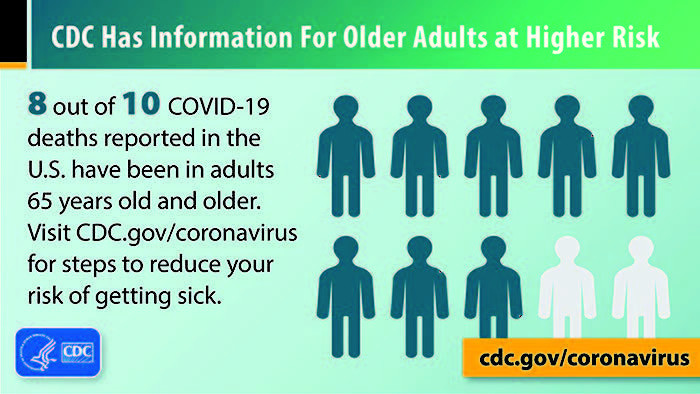
SAN LUIS VALLEY — Among adults, the risk for severe illness from COVID-19 increases with age, with older adults at highest risk. Severe illness means that the person with COVID-19 may require hospitalization, intensive care, or a ventilator to help them breathe, or they may even die.
As one gets older, the risk for severe illness from COVID-19 increases. For example, people in their 50s are at higher risk for severe illness than people in their 40s. Similarly, people in their 60s or 70s are, in general, at higher risk for severe illness than people in their 50s. The greatest risk for severe illness from COVID-19 is among those aged 85 or older.
There are also other factors that can increase the risk for severe illness, such as having underlying medical conditions. By understanding the factors that increase an increased risk, you can make decisions about what kind of precautions to take in your daily life.
In general, the risk of getting severely ill from COVID-19 increases as one gets older. In fact, eight out of 10 COVID-19-related deaths reported in the United States have been among adults aged 65 years and older.
It has been recognized for many years that people 65 years and older are at high risk of developing serious complications from flu compared with young, healthy adults. This risk is due in part to changes in immune defenses with increasing age. While flu seasons vary in severity, during most seasons, people 65 years and older bear the greatest burden of severe flu disease. In recent years, for example, it’s estimated that between 70 percent and 85 percent of seasonal flu-related deaths have occurred in people 65 years and older, and between 50 percent and 70 percent of seasonal flu-related hospitalizations have occurred among people in this age group.
The best way to protect against flu and its potentially serious complications is with a flu vaccine. CDC recommends that almost everyone 6 months of age and older get a seasonal flu vaccine each year by the end of October. However, as long as flu viruses are circulating, vaccination should continue throughout flu season, even into January or later.
Flu vaccination is especially important for people 65 years and older because they are at high risk of developing serious complications from flu. Flu vaccines are updated each season as needed to keep up with changing viruses. Also, immunity wanes over a year so annual vaccination is needed to ensure the best possible protection against flu. A flu vaccine protects against the flu viruses that research indicates will be most common during the upcoming season. Flu vaccines for 2020-2021 have been updated from last season’s vaccine to better match circulating viruses. Immunity from vaccination fully sets in after about two weeks.
Because of age-related changes in their immune systems, people 65 years and older may not respond as well to vaccination as younger people.
The best way to protect against flu and its potentially serious complications is with a flu vaccine. CDC recommends that almost everyone 6 months of age and older get a seasonal flu vaccine each year by the end of October. However, as long as flu viruses are circulating, vaccination should continue throughout flu season, even into January or later.
In addition to getting a flu shot, people 65 years and older should take the same everyday preventive actions CDC recommends for everyone, including avoiding people who are sick, covering coughs, and washing hands often.
Because one is at high risk of developing serious flu complications, if you get sick with flu symptoms, call your health care provider right away. There are antiviral drugs that can treat flu illness and prevent serious flu complications. CDC recommends prompt treatment for people who have influenza infection or suspected influenza infection and who are at high risk for serious flu complications, including people 65 years and older.
Symptoms:Flu symptoms include fever, cough, sore throat, runny or stuffy nose, body aches, headache, chills and fatigue. Some people may also have vomiting and diarrhea. People may be infected with flu and have respiratory symptoms without a fever.
Treatment:
Treatment should begin as soon as possible because antiviral drugs work best when started early (within 48 hours after symptoms start).
To get an antiviral drug, a health care provider needs to write a prescription. These medicines fight against flu by keeping flu viruses from making more viruses in your body.
Antiviral drugs can make your flu illness milder and make you feel better faster. They may also prevent serious health problems that can result from flu illness.
"severe" - Google News
October 28, 2020 at 11:13PM
https://ift.tt/2HL2JNb
Risk for severe illness increases with age - Conejos County Citizen
"severe" - Google News
https://ift.tt/2OrY17E
Shoes Man Tutorial
Pos News Update
Meme Update
Korean Entertainment News
Japan News Update
Bagikan Berita Ini















0 Response to "Risk for severe illness increases with age - Conejos County Citizen"
Post a Comment